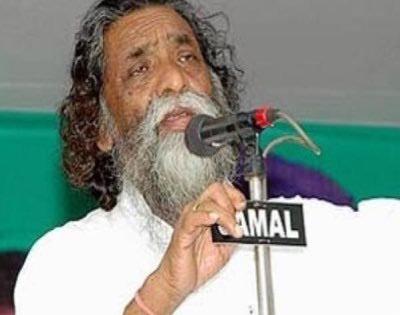Dishom Guruji - the tribal titan who carved Jharkhand from struggle, departs
By IANS | Updated: August 4, 2025 11:19 IST2025-08-04T11:13:42+5:302025-08-04T11:19:47+5:30
New Delhi, Aug 4 Born in the quiet village of Nemra in Ramgarh district -- then part of ...

Dishom Guruji - the tribal titan who carved Jharkhand from struggle, departs
New Delhi, Aug 4 Born in the quiet village of Nemra in Ramgarh district -- then part of undivided Bihar -- Shibu Soren emerged from the soil of struggle. A member of the Santhal tribe, his early life was marked by tragedy: his father was murdered by thugs allegedly hired by moneylenders, a formative event that would shape his lifelong crusade against exploitation.
As general secretary, Soren led agitations to reclaim alienated tribal lands, often dispensing what he called “people’s justice” through informal courts.
His activism, however, was not without controversy. In 1975, he was implicated in a violent campaign against non-tribals in Chirudih, resulting in multiple deaths. Though acquitted in 2008, related charges from earlier incidents remain unresolved.
Soren’s political journey began with a defeat in the 1977 Lok Sabha elections, but he rebounded in 1980, winning from Dumka. Over the next four decades, he would serve multiple terms in the Lok Sabha (1980-1984, 1989-1998, 2002-2019) and stints in the Rajya Sabha, including the current one. His tenure was punctuated by both influence and infamy.
As Union Coal Minister under Prime Minister Manmohan Singh during the UPA regime, he was forced to resign in 2004 due to the revival of the Chirudih case. After a brief period underground and a month in judicial custody, he returned to the Cabinet later that year, a move seen as part of a strategic Congress-JMM alliance ahead of Jharkhand’s Assembly elections.
In 2006, Soren’s political career suffered a severe blow when he was convicted in the 1994 abduction and murder of his personal secretary, Shashi Nath Jha.
The CBI alleged that Jha’s knowledge of illicit political dealings, including a controversial vote-saving arrangement during the Narasimha Rao government, was the motive behind the crime. Though the conviction cast a long shadow, Soren remained a formidable figure in Jharkhand politics. He served thrice as Chief Minister of Jharkhand; briefly in 2005 (March 2-12), then from 2008 to 2009, and again from 2009 to 2010.
For nearly four decades, he helmed the JMM, shaping it into a dominant regional force and becoming its spiritual and political patriarch -- reverently known as Dishom Guruji.
Soren’s personal life was rooted in the same soil he fought for. He was married to Roopi Kisku and fathered four children: Durga, Hemant, Basant, and Anjali.
Durga Soren served as MLA from Jama (1995-2005) before his untimely death. Hemant Soren, his political heir, currently serves as Chief Minister of Jharkhand, having held the post previously from 2013 to 2014. Basant Soren, the youngest son, is an MLA from Dumka and leads the JMM’s youth wing.
In June 2025, Shibu Soren was admitted to Sir Ganga Ram Hospital in Delhi, battling kidney ailments and the aftermath of a stroke. Despite being placed on life support, his condition deteriorated.
On August 4, at 8.56 a.m., he was declared dead by Dr A.K. Bhalla, head of nephrology at the hospital.
His passing marked the end of an era.
Hemant Soren, in a deeply emotional tribute, wrote: “Respected Dishom Guruji has left us all... I have become 'shunya' (zero) today.”
Shibu Soren’s legacy is complex -- woven with resistance, reform, controversy, and conviction. He leaves behind a political lineage, a tribal movement, and a state that bears the imprint of his lifelong struggle.
Disclaimer: This post has been auto-published from an agency feed without any modifications to the text and has not been reviewed by an editor
Open in app